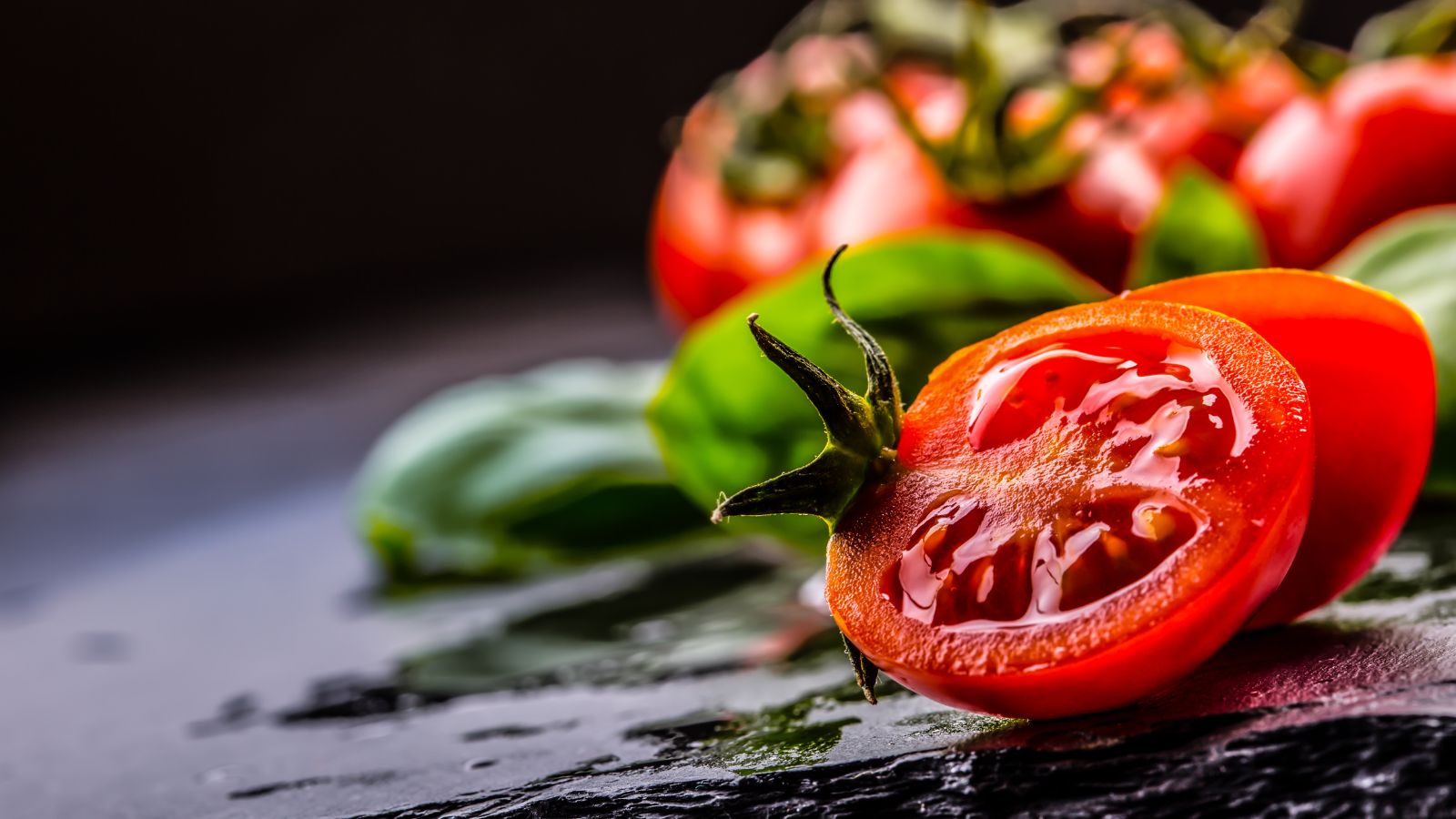
Can Chickens Eat Tomatoes? Safe Treats for a Healthy Flock
Photo Credit: Canva Pro
Can chickens eat tomatoes? Yes, but only the ripe red ones. Despite being full of water and nutrients, tomatoes are a healthy snack. However, parts of the tomato, like the leaves and the green tomato, are not good for them. From raw vegetables to fresh fruits, this guide tells you what chickens can safely eat.
To keep your chickens happy, healthy, and laying good eggs, you'll also learn what not to feed them. How about we make it easy for you to feed your winged friends?
Can Chickens Eat Tomatoes?
Photo Credit: Canva Pro
Are Tomatoes Safe or Toxic for Chickens?
Chicks can eat ripe tomatoes as a healthy snack. They provide hydration and nutrients , but some parts of the tomato plant are toxic. Chickens should only eat the red part of a ripe tomato, not its stems or leaves.
-
Ripe tomatoes: Safe for chickens to eat as a fresh or cooked treat.
-
Green parts of the tomato plant: Toxic due to solanine and should be avoided.
-
Tomato stems, leaves, and flowers: Never feed to chickens or baby chicks.
-
Unripe tomatoes and green cherry tomatoes: Contain solanine, which can be toxic and may cause digestive issues in chickens.
-
Moldy tomatoes or rotten tomatoes: Should always be discarded.
Health Benefits of Ripe Tomatoes for Chickens
Chickens eat tomatoes for more than just the taste; they like to peck at them and get nutrients from them. Giving chickens fresh tomatoes every once in a while can help their diet and improve their health as a whole.
-
Hydrating treat: Tomatoes are 90% water and help during heat.
-
Egg quality: Supports immune function and boosts shell strength.
-
Nutritious snack: Rich in vitamin C, folate, and antioxidants.
-
Encourages activity: Whole fresh tomatoes stimulate pecking.
-
Treat blends: Chickens can eat tomatoes in MannaPro’s Harvest Delight mix.
-
Feeding tip: Chop into bite-sized pieces to prevent choking.
What Vegetables Are Not Good for Chickens?
Photo Credit: Canva Pro
Vegetables and Plants Chickens Should Never Eat
While chickens eat a wide range of produce, some vegetables can cause harm. Chicken owners must avoid feeding items from the nightshade family, as well as plants that carry natural toxins or mold.
-
Uncooked beans: Contain hemagglutinin, highly toxic to chickens.
-
Rhubarb leaves: Packed with oxalic acid, which harms kidneys.
-
Raw potatoes and green potato peels: Contain solanine, just like unripe tomatoes.
-
Tomato plant foliage: Tomato leaves and stems are part of the nightshade family.
-
Chickens eat bell peppers: Yes, but only the fruit—never the leaves or stem.
-
Chocolate and caffeine: Cause seizures and death.
-
Moldy food: Includes moldy tomatoes and vegetables; always discard.
-
Onions: Contain sulfur compounds that cause anemia in chickens.
-
Avocado skins and pits: Contain persin, which is harmful.
Why These Foods Can Harm Chickens
There are toxins in some vegetables that harm chickens' organs and digestive system. Even small amounts can stop laying eggs or make birds sick, especially laying hens or baby chicks.
-
Natural toxins: Solanine (nightshades), oxalic acid (rhubarb), cyanogenic glycosides (apple seeds, stone fruit pits.)
-
Digestive effects: Vomiting, diarrhea, crop impaction, organ damage.
-
Egg impacts: Weakened shells, reduced egg production, off-flavored eggs.
-
Feeding advice: Never mix questionable vegetables with regular feed or cooked rice.
-
Watch for symptoms: Lethargy, ruffled feathers, pale combs, or reduced appetite.
-
Chicken owners: Supervise chickens to ensure safe foraging in gardens.
Can Chickens Eat Tomato Seeds and Skins?
Photo Credit: Canva Pro
Are Tomato Seeds Harmful?
Tomato seeds are safe for chickens to eat, despite what some people say. They contain no toxins, and chickens’ digestive systems are well-equipped to handle them without risk of sprouting.
-
Tomato seeds: Safe when fed in moderation as part of the ripe fruit.
-
Cherry tomatoes: Seeds pose no health threat to adult chickens.
-
Myth debunked: Seeds won’t grow in the crop or digestive tract.
-
Red-colored droppings: Normal after chickens eat tomatoes; not blood.
-
Chickens tomatoes: Natural part of their foraging if tomatoes are ripe and flesh-only.
Feeding Tomato Skins and Cooked Leftovers
In small amounts, you can give both raw and cooked tomatoes. It's easier for chickens to eat cooked tomatoes when they're mixed with other soft foods like cooked carrots or sweet potatoes.
-
Tomato skins: Fine in moderation; offer as part of ripe tomatoes.
-
Cooked tomatoes: Safe in small amounts, with no added salt or spices.
-
Tomato remnants: Only plain, cooked tomato remnants without additives are safe.
-
Avoid feeding: Any tomato parts that show mold or spoilage.
-
Baby chicks: Should not be fed tomato skins or raw tomatoes until 6–8 weeks old.
-
Chickens eat eggs and vegetables: Rotate snacks to keep the chicken’s diet balanced.
What is the Healthiest Fruit for Chickens?
Photo Credit: Canva Pro
Top Fruits for Chicken Health and Nutrition
A well-balanced diet can include many types of fruit that chickens love. Nutrient-dense fruits that are low in sugar and high in water and antioxidants are the best. When served right, fruits can be a tasty treat that supports a healthy flock.
-
Berries (blueberries, blackberries, strawberries): Antioxidant-rich and easy to peck.
-
Watermelon: Great hydrating treat; chickens eat watermelon readily during summer.
-
Apples: Core removed, apples are rich in fiber and chickens eat apples happily.
-
Grapes: Seedless grapes are safe; slice to avoid choking.
-
Pumpkin: Chickens eat pumpkin seeds and flesh for deworming support.
-
Melons and cantaloupe: Seasonal favorites high in water and vitamins.
-
Peaches and bananas: Chickens eat bananas and peaches in small amounts.
Fruit Feeding Tips for a Balanced Diet
If a chicken eats too much fruit, it can make its stomach worse or make its food less healthy. You should only give fruits as extra treats and not as meals.
-
Feed in moderation: Too much sugar can cause diarrhea.
-
Chop into bite-sized pieces: Prevents choking and waste.
-
Rotate options: Variety ensures balanced nutrients.
-
Chickens eat oranges: Only in small amounts due to acidity.
-
Chickens eat pineapple: Offer ripe pineapple flesh only.
-
Chickens eat cantaloupe: Scoop seeds and offer small chunks.
-
Avoid feeding daily: Treats should be <10% of total diet.
What Can Chickens Eat Raw?
Photo Credit: Canva Pro
Raw Vegetables and Fruits That Are Safe
As long as it's safe, raw food is often healthier than cooked food. Chickens can get natural vitamins, fiber, and water from a lot of raw foods.
-
Chickens eat carrots: Shredded raw carrots are high in beta carotene.
-
Chickens eat broccoli: Contains antioxidants and supports feather growth.
-
Chickens eat cabbage: Hanging a cabbage keeps chickens entertained.
-
Chickens eat asparagus: High in nutrients; may affect egg flavor.
-
Chickens eat celery: Chop fine due to fibrous strings.
-
Chickens eat mushrooms: Store-bought mushrooms are safer, but feed only occasionally and in small amounts.
-
Chickens eat strawberries: Include tops; safe and loved by most flocks.
-
Chickens eat raw tomatoes: As long as ripe and free of green parts.
-
Chickens eat fresh tomatoes: Ideal on hot days as a hydrating treat.
Precautions When Feeding Raw Foods
Even though chickens can eat many raw foods, care must be taken to keep them from getting sick or having stomach problems. Wash all items and monitor flocks for any changes.
-
Wash thoroughly: Removes pesticide residues.
-
Remove inedible parts: Avoid seeds, stems, or toxic skins.
-
Use grit: Helps break down raw foods in the digestive tract.
-
Balance with feed: Raw snacks should never replace regular feed.
-
Chickens eat uncooked rice: Avoid — may expand in the crop.
-
Chickens eat cooked rice: Yes, in small amounts with veggies.
-
Raw or cooked carrots: Both are safe; cooked is easier to chew.
-
Raw pumpkin seeds: Support deworming and immune health.
About FullyHealthy: Natural Tomato-Free Alternatives
Tomato-Free Kitchen Products for Your Household
FullyHealthy offers convenient, nutritious tomato-free foods that make it easier for households with chickens to avoid tossing tomato waste.
-
KC Natural Traditional-Style Pasta Sauce: Uses carrots and beets instead of tomatoes.
-
KC Natural Carrup Ketchup: Tomato-free blend safe for compost scraps.
-
Wild Zora Tuscan Chicken Soup: Includes spinach and pumpkin—chicken-safe ingredients.
-
Safe for humans and chickens: Reduces risk of toxin exposure in the coop.
-
Chickens to eat leftovers: Safer when sauces don’t include tomato stems or additives.
Why Tomato-Free Doesn’t Mean Less Flavor or Nutrition
Tomato-free goods are made with safe, vibrant, and nutrient-dense alternatives that taste great. These choices also keep you from giving chicken food scraps that have dangerous additives or parts of nightshade plants.
-
Made with: Carrots, pumpkin, vinegar, beets, and natural flavor enhancers.
-
Avoids risk: No tomato stems or unripe green tomatoes in waste.
-
Compost-safe: Scraps less likely to include moldy tomatoes or toxic plants.
-
Chicken owners: Easier to manage food scraps in coops with peace of mind.
-
Perfect for families with backyard chickens: Keep treats clean and safe.
Final Thoughts
Chickens love fresh snacks, but even healthy treat options like red tomatoes need balance in the chicken flock’s regular feed. Because chickens like nutritious treat like carrots, cheese, and bread, give them small pieces of those foods as treats. Sunflower seeds are good for them and will help the health quality of their egss .
Chickens eat watermelon as a treat that keeps them hydrated and also helps keep their digestive system healthy. Make sure your feathered friends are safe by not giving them dangerous food scraps. Your chickens depend on you to always feed them smart so they can eat and grow.
FAQs
Can chickens eat bread and rice every day?
Chickens eat bread and chickens eat rice but not daily; both lack beneficial nutrients.
Can chickens eat carrots and cheese?
Chickens eat carrots raw or cooked, and chickens eat cheese in small bits as a healthy treat.
Are red tomatoes better than bell peppers for chickens to eat?
Red tomatoes are a hydrating treat but chickens eat bell peppers too; serve both as bite sized pieces.
What helps improve egg quality in my chicken flock?
Sunflower seeds, regular feed, and growing tomatoes with care help support egg quality.
What should I avoid feeding my feathered friends?
Avoid feeding moldy scraps to protect their digestive tract and keep chickens to eat safely; chickens eat avocado only in tiny amounts.

Leave a comment